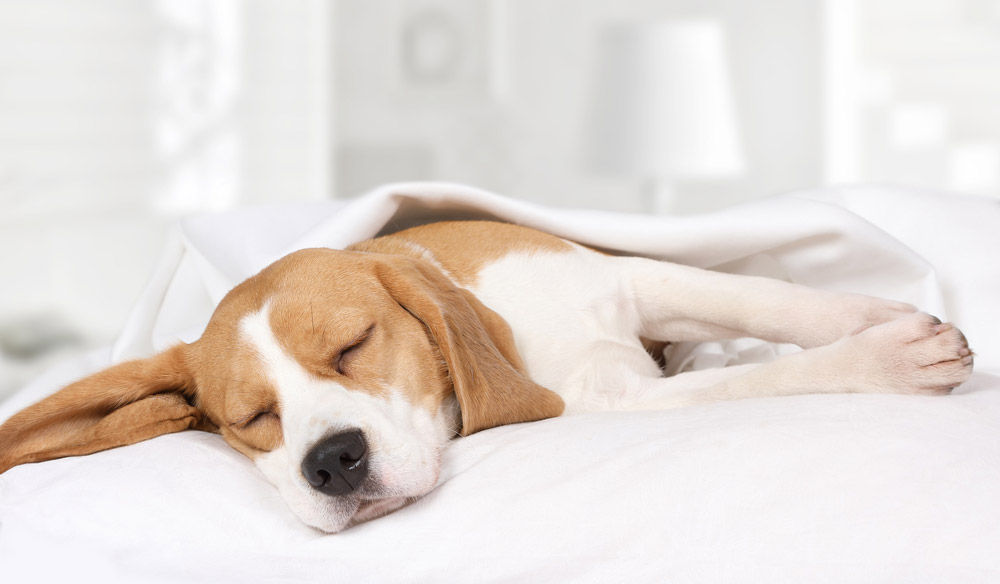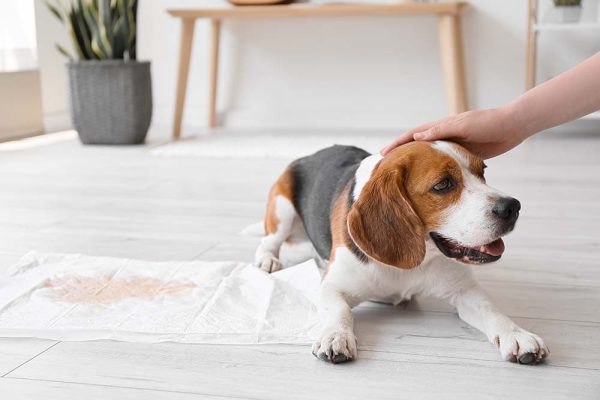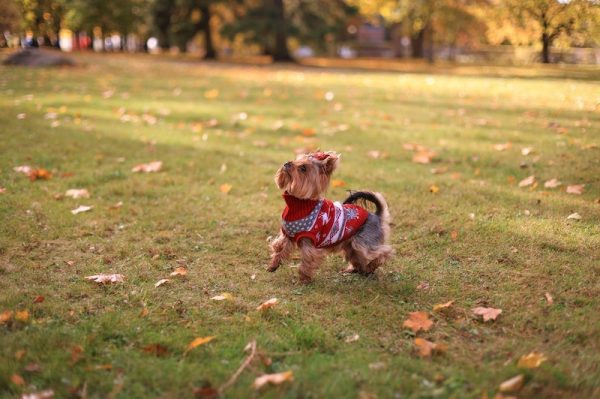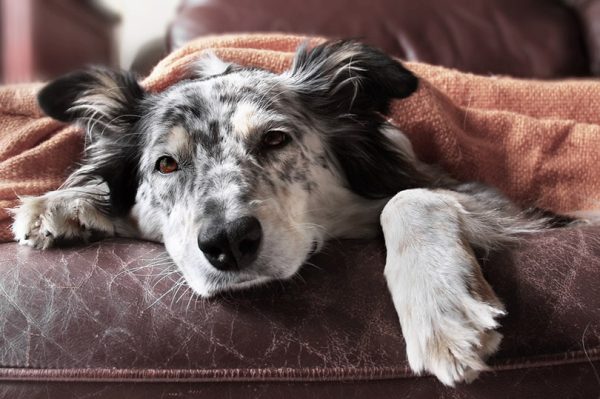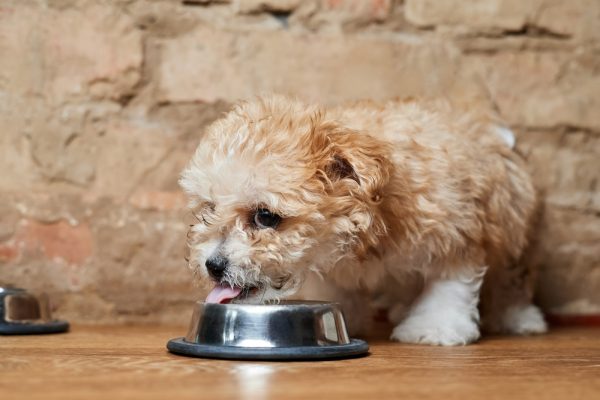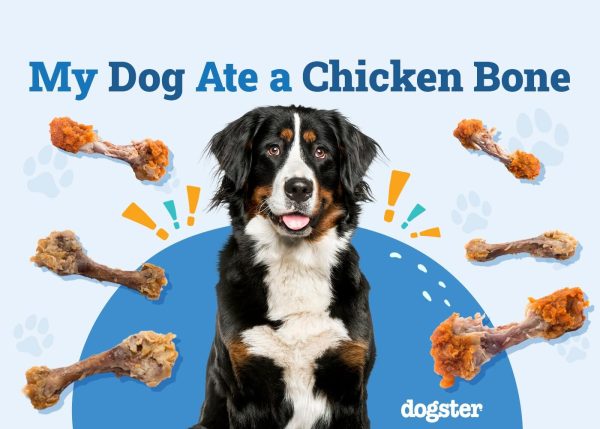If you have ever known a Pug or Bulldog, you might already know the answer to this question. Do dogs snore? Some dogs definitely snore, snort, and make all sorts of other nasally noises, especially dogs of certain breeds.
So, if you’re wondering if a dog snores, think no more about it. They certainly may do so. However, sometimes it’s sudden or not normal, so we want to explain exactly when this could cause some concern.

Why Do Dogs Snore?
The definition of snoring is a snorting or grunting sound produced during sleep. Just like us, when dogs sleep, their muscles relax. In dogs, the sound is produced when air flows past the relaxed tissues within their throat as they sleep. The sound is the result of the vibration of those tissues as air flows over them.
There is no scientific data on how common snoring is in all pet dogs across all breeds. However, studies have demonstrated that brachycephalic (flat-faced) dogs statistically snore more than normocephalic (a normal snout shape) dogs as a whole 1.
Dogs may snore on occasion or on a regular basis. Generally speaking, dogs that only snore on occasion or when they’re unwell (such as when they have a flu) do not need medical attention for their snoring episodes.
However, persistent snoring can be problematic for some dogs, and can exacerbate other health issues as well. Though snoring isn’t considered a sleep disorder in itself for dogs, it is recognized as a sign for certain sleeping disorders that can affect dogs 2.
The 5 Common Reasons Why Dogs Snore
1. Brachycephalic Breeds
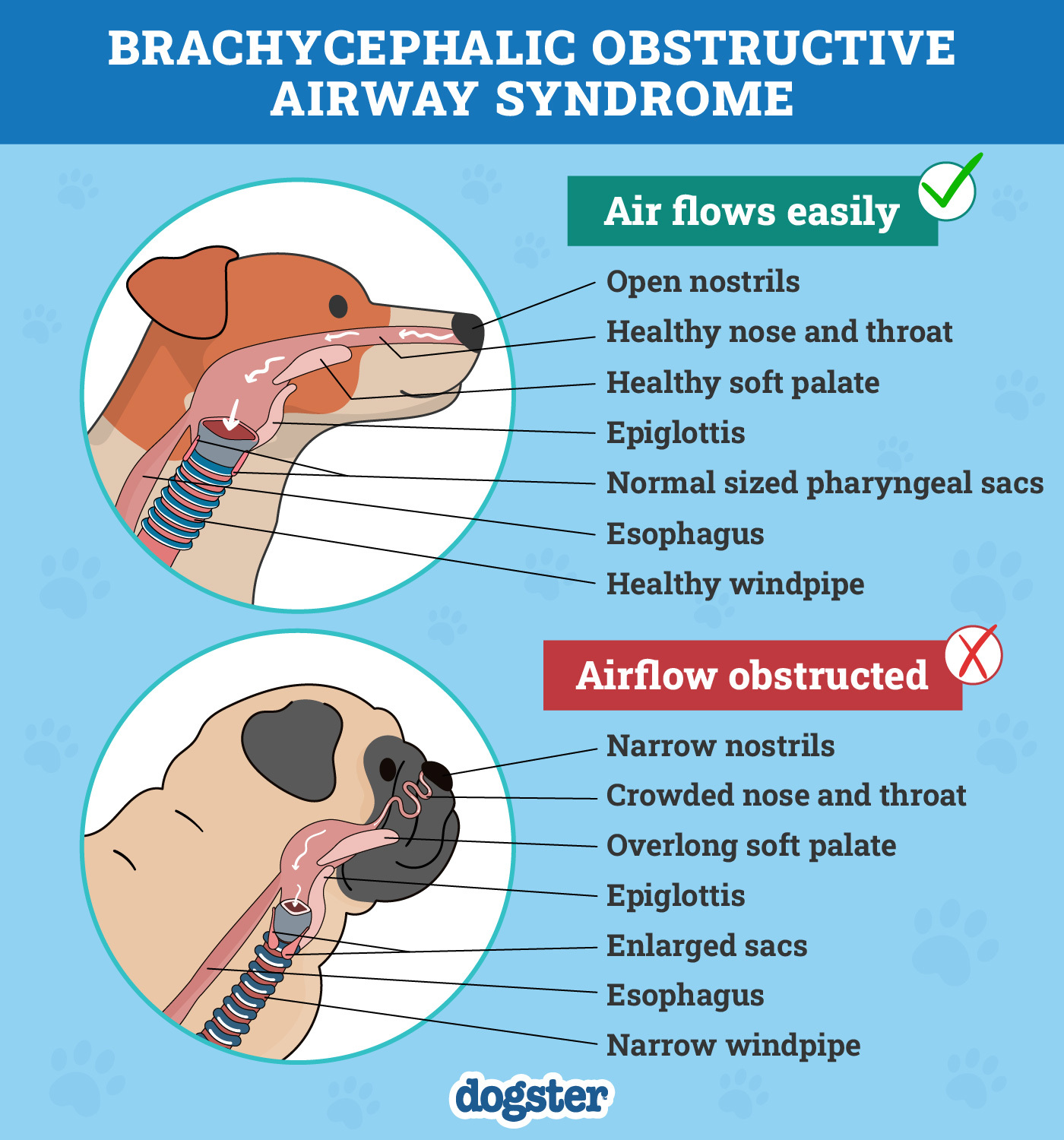
For brachycephalic breeds, it is to be expected for them to have some degree of snorting or snoring behavior. Many owners considered this behavior relatively normal in these breeds 3. These dogs have a more obstructed airway due to their shorter snouts, causing breathing difficulty and other issues related to breathing. Some examples of brachycephalic breeds include:
- Bulldog
- French Bulldog
- Cavalier King Charles Spaniel
- Lhasa Apso
- Pug
- Mastiff
- Boxer
- Boston Terrier
- Cane Corso
- Japanese Chin
- Pekingese
- Shih Tzu
- Chinese Shar-Pei
All brachycephalic breeds have a condition known as Brachycephalic Obstructive Airway Syndrome (BOAS). This is due to their anatomical abnormalities they’re born with. The most common abnormalities seen in these breeds include the following:
- Stenotic nares – pinched, narrow nostrils which make breathing difficult
- Elongated soft palates – a soft palate which can extend to beyond the tip of the epiglottis toward the airway, making breathing difficult
- Redundant pharyngeal folds – extra folds of tissue which can make the opening of the airway narrower, increasing the odds of obstruction during sleep
- Tracheal hypoplasia – a narrower than normal trachea (windpipe)
These abnormalities often increase the likelihood of your dog snoring when they sleep. Two sleep-related breathing disorders have been observed in dogs and are very common in brachycephalic breeds 4.
- Obstructive sleep apnea – when this occurs, dogs breathe more heavily than normal during their sleep and are highly likely to snore
- Central sleep apnea – dogs do not produce a sound when this occurs; they can be seen attempting to breathe for several attempts while still asleep. This often ends with a large rush of air as the dog’s body attempts to correct the respiratory distress they experience during their sleep. It often reverts back to the obstructive sleep apnea pattern.
Owners are encouraged to seek advice from their veterinarian if they notice these dogs as they sleep. Treatment and management of such dogs (and their snoring) is done on a case-by-case basis and may involve surgical correction of the anatomical defects in your brachycephalic dog.
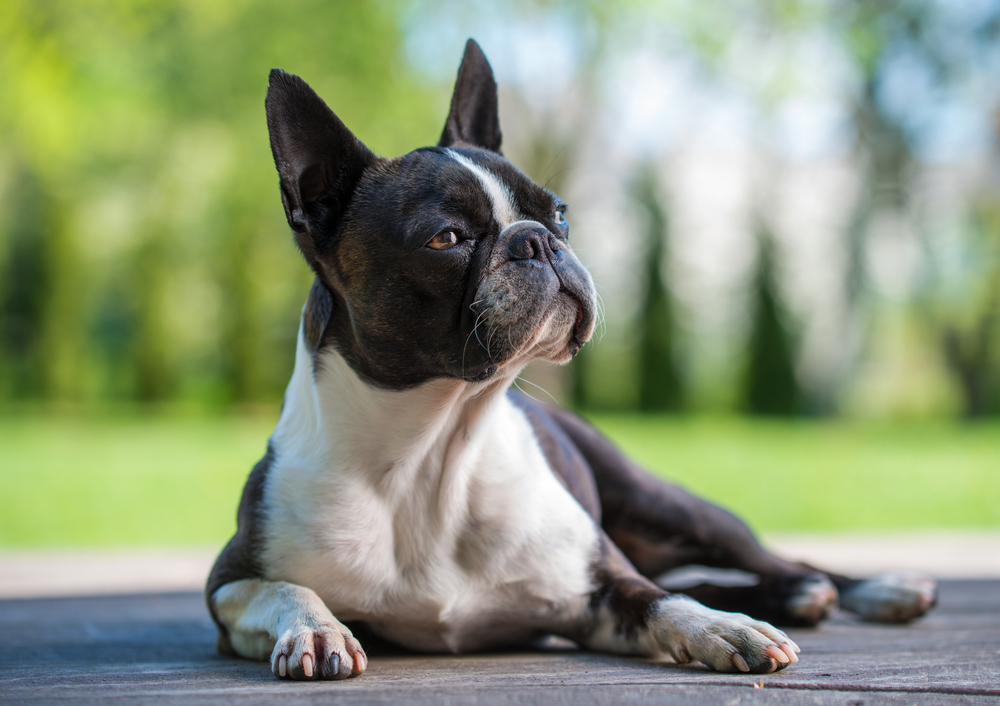
2. Obesity
Obesity is a risk factor for snoring and other sleep disorders in dogs. In essence, any dog that’s overweight or obese is at an increased risk of snoring and may also be more likely to develop additional health problems.
3. Respiratory Tract Ailments & Disorders
If your dog’s airways or lungs are infected, inflamed, or if they develop other ailments (such as an abnormal growth), it may lead to issues like snoring. Dogs that have environmental allergies (such as from pollen or dust) are more likely to snore if their allergies flare up.
Dogs with asthma are also considered at higher risk for snoring, especially when their asthma flares up.
Generally, when snoring occurs due to such ailments or disorders, it may resolve once the underlying issue is treated or controlled. As always, your veterinarian should be your primary point of contact to ascertain what your dog is experiencing and how it can be managed.
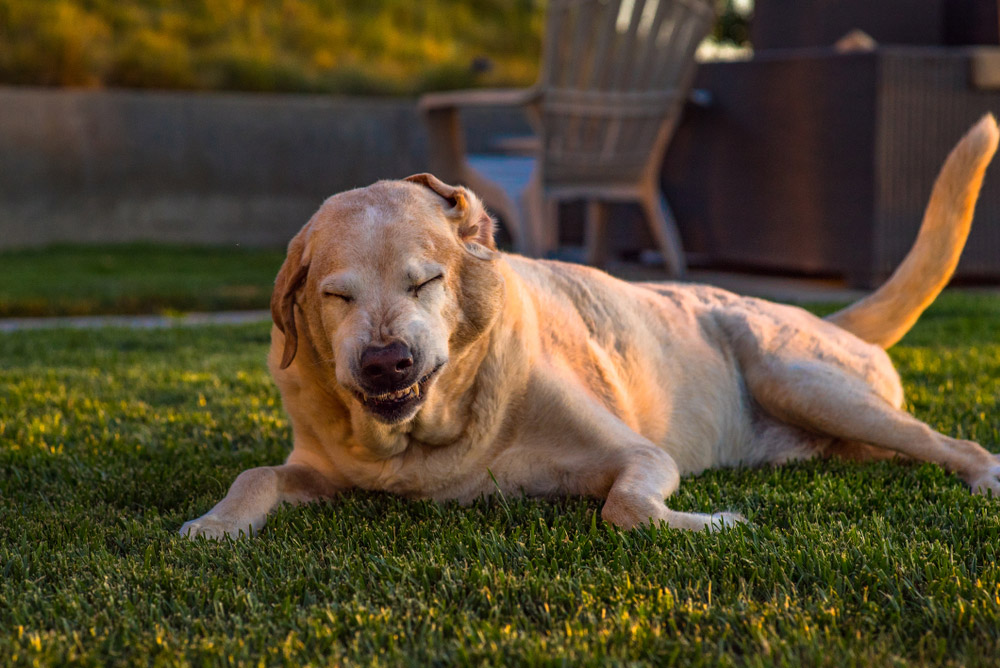
4. Sleep Position
Sometimes, we all can sleep in pretty funky positions and our pets are no exception. If your dog is sleeping in such a way that they are cutting off their airway, it can cause positional snoring. This usually isn’t a cause for concern and definitely doesn’t happen every single time they’re sleeping.
But it can happen from something as simple as their head being propped up on the arm of the chair while their body rests on the primary part of the cushion. However, some dogs have a preference for a specific sleeping position (in which they still snore), simply because it’s the most comfortable position for them. This is commonly observed in brachycephalic breeds.
5. Age
Dogs that never snored or only snored lightly may snore more frequently or loudly as they enter their senior years. This is thought to be because the muscles and tissues of their throats and necks tend to not be as tight as they were in their younger years, and therefore, their looser anatomy might increase the likelihood and sound levels of their snoring.

When Should You Call a Vet?
Dogs that snore only on occasion are generally considered to be healthy and don’t need immediate emergency veterinary care. However, you are advised to seek veterinary care in the following scenarios.
- Sleep Interruptions – your dog wakes up mid-sleep while holding their breath, gasping, or seemingly choking. They’re often extremely distressed when this happens.
- Lethargy – your dog doesn’t seem as lively when they’re awake, even when they are simply sitting or standing.
- Falling asleep – your dog falls asleep or attempts to sleep during periods of normal activity despite having slept not too long ago
- Breathing interruptions during sleep – your dog’s breathing isn’t rhythmic or normal as they sleep
- Sleeping position preference – your dog prefers to sleep in a very specific position, such as with their chin elevated, in a seated position, or with their favorite toy in their mouth.
- Recent snoring – if your dog has never snored before, but has recently started doing so
As a failsafe, it’s generally recommended to seek veterinary care anytime you feel like your dog isn’t sleeping normally or well enough.
If you need to speak with a vet but can't get to one, head over to PangoVet. It's our online service where you can talk to a vet online and get the advice you need for your dog — all at an affordable price!


Conclusion
Dogs can snore when they sleep, just like us. Some dogs only snore on occasion, whereas others can do so on a frequent or alarming basis. Snoring can be a sign of other disorders in dogs and is of particular concern in brachycephalic breeds. If you think that snoring is somehow impacting your dog’s daily life, it is important to get them into your vet so they can get the care they need and deserve.
Featured Image Credit: Kuznetsov Alexey, Shutterstock

